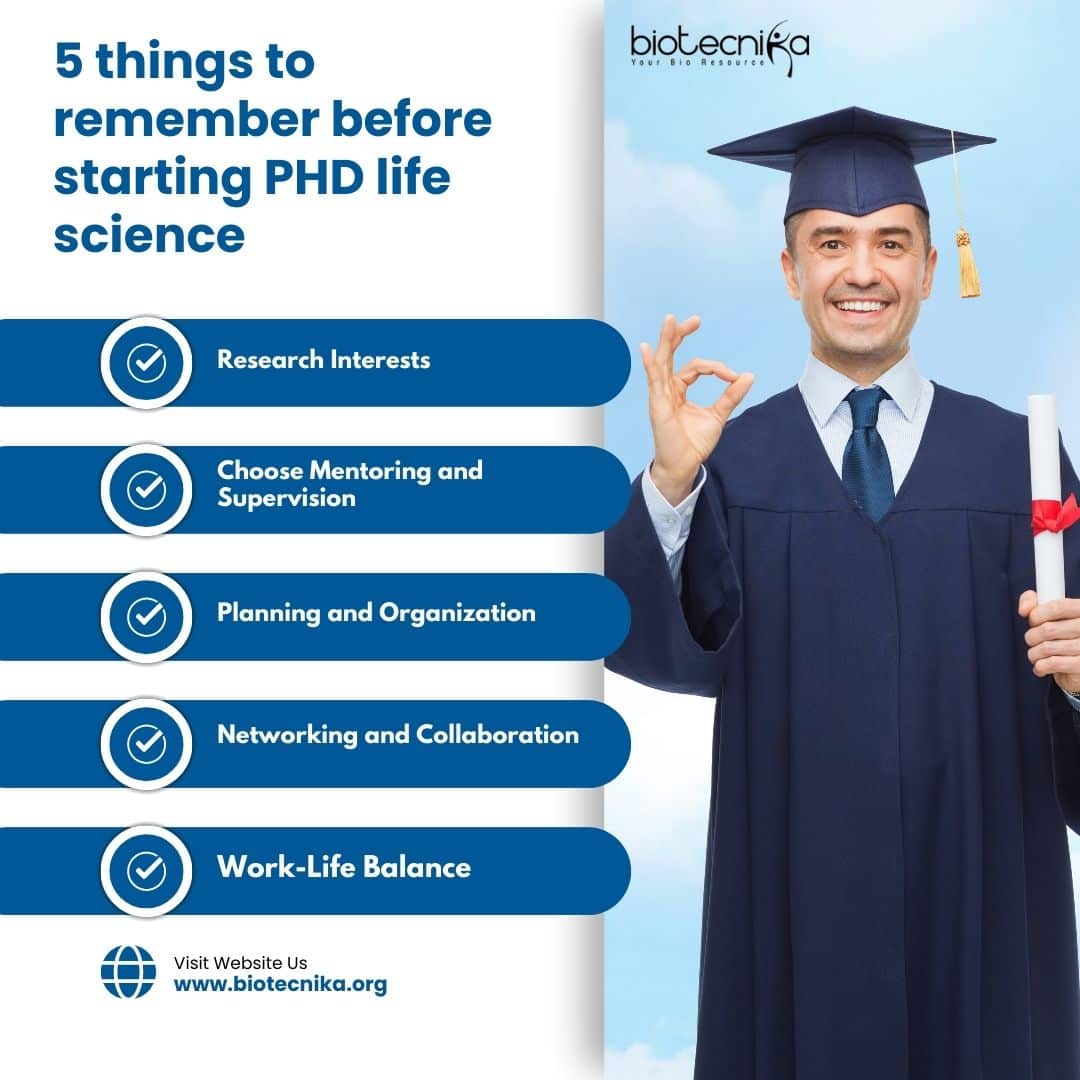Points To Think about Before Pursuing PhD Life Science
The decision to pursue a Ph.D. in Life Sciences is a significant commitment that requires careful consideration. This article aims to provide prospective students with a comprehensive guide on essential factors to evaluate before embarking on this challenging yet rewarding journey.
Importance of Considering Important Factors Before Starting a Life Science Ph.D.
Embarking on a Life Science Ph.D. requires more than just a passion for science. You need to consider several factors such as your research interests, the potential impact of your work, choice of advisors, availability of resources, and much more. By considering these factors, you set yourself up for success and ensure your efforts align with your long-term career aspirations.
In this article – Points To Think about Before Pursuing PhD Life Science, we will explore ten essential things to ponder before starting a Life Science Ph.D. Let’s dive in!
- Clarify your research interests
Before committing to a Life Science Ph.D., it’s essential to have a clear understanding of your research interests. Life Sciences is a vast field encompassing numerous disciplines, such as biology, biochemistry, genetics, and more. Take time to reflect on your passions and the specific areas of research that intrigue you. By narrowing down your interests, you can choose a field of study that aligns with your goals and strengths.
- Research the potential advisors
Selecting the right advisor is crucial for a successful Ph.D. journey. Look for advisors who have expertise in your chosen field of study and have a track record of successful mentorship. Research their previous work and publications to gauge their research interests and compatibility with your own. A supportive and experienced advisor will play a pivotal role in shaping your research and guiding your career.
- Consider the program’s reputation and resources
The reputation of the Ph.D. program you choose can greatly impact your future opportunities. Research and evaluate the program’s ranking, reputation, and achievements in the field of Life Sciences. Consider factors such as the faculty’s expertise, available resources, and collaborations with other institutions. A program with a strong reputation and ample resources can provide you with a stimulating and enriching research environment.
- Funding opportunities and financial considerations
Pursuing a Ph.D. often involves financial considerations. Explore funding options such as scholarships, grants, or assistantships offered by the program or external funding bodies. Additionally, consider the cost of living in the area where the program is located. It’s essential to have a clear understanding of the financial aspects and potential challenges to ensure you can focus on your research without undue financial stress.
- Work-life balance and mental health
A Ph.D. program can be demanding, both intellectually and emotionally. Maintaining a 
- Networking and collaboration opportunities
Building a strong network and engaging in collaborations are invaluable for your growth as a researcher. Look for opportunities to attend conferences, seminars, and workshops in your field. Networking with peers and experts in the scientific community can broaden your horizons and open doors to exciting collaborations and interdisciplinary research projects.
How To Get Started With Ph.D. Research – Complete Guide pdf download
- Publication and career prospects
Very important Point To Think about Before Pursuing PhD Life Science – Publications play a significant role in advancing your career as a researcher. Understand the importance of publishing your work in reputable journals to gain recognition within the scientific community. Additionally, explore potential career paths beyond academia that align with your research expertise, such as industry positions, government roles, or science communication.
- Long-term commitment and perseverance
A Life Science Ph.D. requires long-term commitment and perseverance. Research projects can encounter setbacks, experiments may fail, and progress may seem slow at times. It’s essential to stay motivated and maintain your passion for your research. Seek support from peers, mentors, and support networks to overcome challenges and stay focused on your goals.
- Seek advice and guidance
Don’t hesitate to seek advice and guidance from those who have already embarked on a Life Science Ph.D. journey. Reach out to current Ph.D. students and graduates to gain insights into their experiences and challenges. Mentors and professionals in the field can provide valuable advice and guidance to help you make informed decisions along the way.
10. Development of Transferable Skills and Professional Development Opportunities
Beyond the specific technical and research skills required in your Ph.D. work, there are numerous other ‘transferable’ skills that are equally crucial for career success. These can include skills in project management, communication, leadership, problem-solving, and more. Additionally, many of these skills can be highly attractive in a range of careers outside of academia, should you choose to pursue that path. It’s therefore important to consider whether your chosen Ph.D. program offers opportunities for the development of such skills.
Similarly, some programs also offer explicit professional development opportunities, such as workshops on grant writing, internships in industry or policy, or mentorship programs, which can be beneficial for both personal growth and future employability. These should be considered as an additional factor in your decision-making process.
Conclusion
In conclusion, starting a Life Science Ph.D. is an exciting but significant step in your academic and professional journey. By considering the ten factors mentioned in this article – Points To Think about Before Pursuing PhD Life Science, you will be better prepared to make informed decisions and navigate the challenges that may arise. Remember to clarify your research interests, research potential advisors, evaluate program reputation and resources, consider funding options, prioritize work-life balance and mental health, explore networking opportunities, understand the importance of publication and career prospects, commit for the long term, and seek advice and guidance when needed. Best of luck on your Life Science Ph.D. adventure!
FAQs
Q: How long does a Life Science Ph.D. typically take to complete?
A: The duration of a Life Science Ph.D. program can vary but usually takes around 4-6 years to complete, depending on the research area and individual progress.
Q: Can I change my research focus during a Life Science Ph.D. program?
A: Yes, it is possible to shift your research focus during a Ph.D. program, especially in the early stages. However, it’s important to consider the implications and discuss with your advisor to ensure a smooth transition.
Q: What are some alternative career paths for Life Science Ph.D. holders?
A: Life Science Ph.D. holders can pursue various career paths, including academia, industry research, science communication, consulting, government positions, and entrepreneurship.
Q: How can I manage stress and maintain a healthy work-life balance during my Ph.D.?
A: Strategies for managing stress and maintaining work-life balance during a Ph.D. include setting boundaries, prioritizing self-care, seeking support, delegating tasks when possible, and engaging in activities outside of academia.
Q: Is it necessary to have publications before completing a Life Science Ph.D.?
A: While having publications can enhance your academic profile, it is not a requirement to have them before completing your Ph.D. However, publishing research findings is highly encouraged to contribute to your field and strengthen your future career prospects.
Points To Think about Before Pursuing PhD Life Science







































